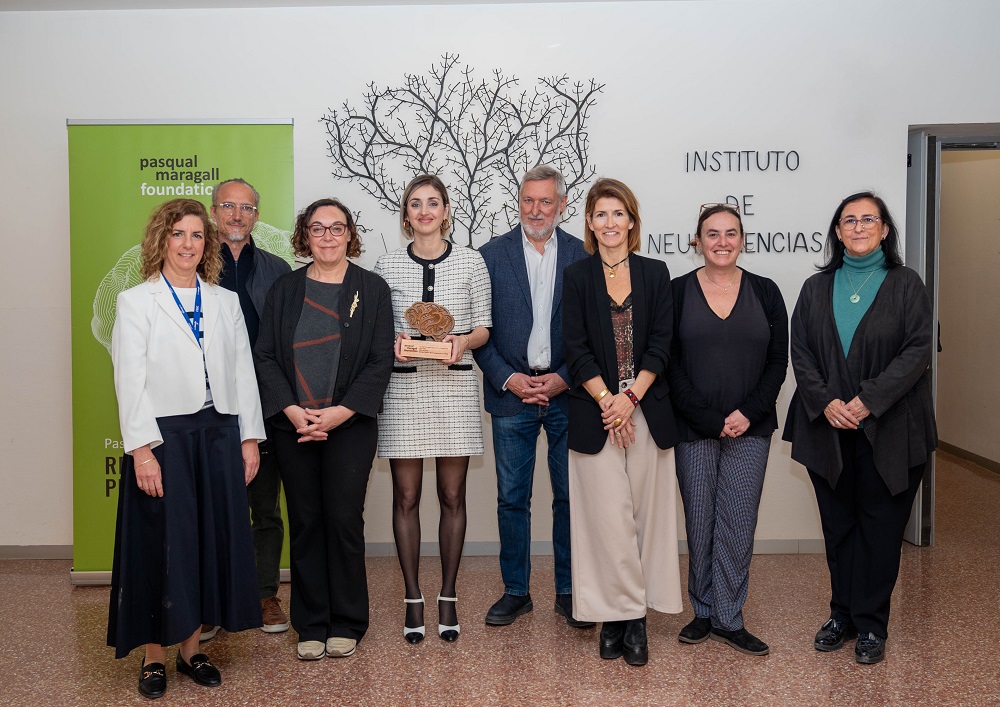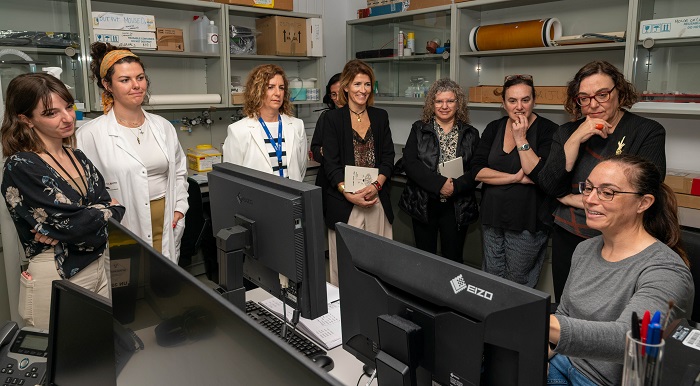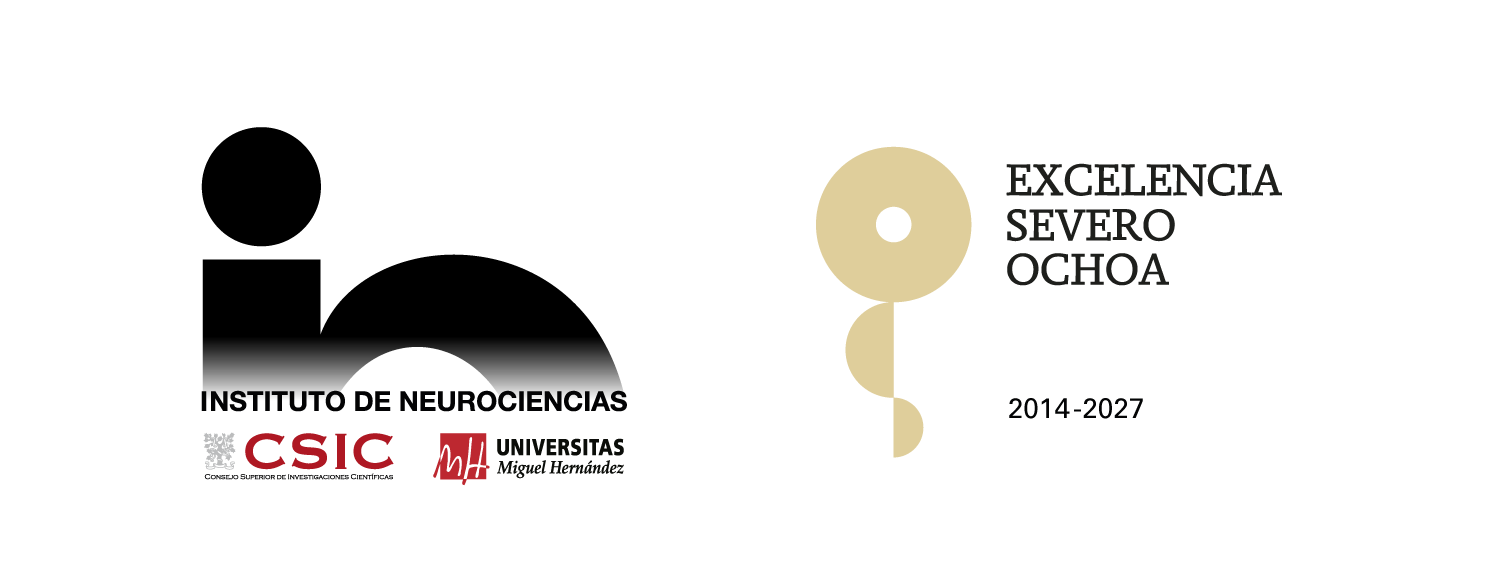The Pasqual Maragall Foundation visits the Institute for Neuroscience to award the Pasqual Maragall Researchers Programme grant
11 de April de 2025
Cristina Maragall, president of the Pasqual Maragall Foundation, and Glòria Oliver, deputy general director, visited the Institute for Neuroscience (IN), a joint center of the Spanish National Research Council (CSIC) and the Miguel Hernández University (UMH) in Elche, today. The visit marked the official awarding of the Pasqual Maragall Researchers Programme grant to researcher Silvia De Santis. Through this project, the researcher will study the role of microglia in Alzheimer’s disease.

Photo: (from left to right) Guillermina López Bendito, Antonio Ivorra, Cristina Maragall, Silvia De Santis, Domingo Orozco, Glòria Oliver, Carolina Minguillón y María Teresa García. IN CSIC-UMH
As part of its scientific and social commitment to Alzheimer’s research, the Pasqual Maragall Foundation launched the second edition of this program in 2024, with a total endowment of €1.6 million. The aim is to support clinical or translational research projects focused on Alzheimer’s or other age-related neurodegenerative diseases. “The awarded projects are outstanding examples of innovation and scientific excellence, and we are confident they will contribute significantly to accelerating the development of solutions against dementia. These initiatives are key to advancing toward a future where dementia is a thing of the past,” stated Glòria Oliver, deputy director of the Pasqual Maragall Foundation.
For her part, De Santis highlighted the opportunity the grant represents for her research: “Microglia-mediated brain inflammation is one of the key factors in the early stages of Alzheimer’s. This work will allow us to understand its role in disease progression better and could open the door to new therapies”.
The Pasqual Maragall Foundation board was welcomed by Domingo Orozco Beltrán, Vice-Rector for Planning and Social Responsibility at UMH, along with the IN's executive team. After an initial meeting, during which IN deputy directors Guillermina López Bendito and Santiago Canals presented the Institute's main strategic lines on translation and innovation, the delegation toured several facilities to gain firsthand insight into experiments and meet the team involved in the project.
The visit began at the IN’s Molecular Imaging Facility. There, De Santis’s team demonstrated the use of their equipment by performing a magnetic resonance imaging (MRI) experiment on an anesthetized animal model. During the demonstration, attendees observed real-time brain images obtained with different contrasts. Once processed with specialized algorithms, these images help better understand the structure and function of brain tissue.
Next, the group visited the Translational Imaging Biomarkers Laboratory within the Department of Molecular Neurobiology and Neuropathology. There, attendees learned about key aspects of De Santis’s project, including preliminary results obtained in recent months. Thanks to the funding provided by the grant, the researcher and her team are developing new imaging-based diagnostic tools that could transform the study of neurodegenerative diseases.
 Specifically, the laboratory has developed an innovative, non-invasive brain imaging technique based on water diffusion-weighted MRI. This method enables the monitoring of microglial activity, the brain’s primary immune cells involved in processes such as inflammation and neurodegeneration. The project’s goal is to apply this technology to animal models of Alzheimer’s disease and, in a second phase, adapt it for human studies. This work is being conducted in collaboration with the Alfa Study at the Barcelonaβeta Brain Research Center, which has been monitoring a large cohort of volunteers at risk for Alzheimer’s for over a decade. The researchers hope to integrate this new imaging protocol into future clinical assessments.
Specifically, the laboratory has developed an innovative, non-invasive brain imaging technique based on water diffusion-weighted MRI. This method enables the monitoring of microglial activity, the brain’s primary immune cells involved in processes such as inflammation and neurodegeneration. The project’s goal is to apply this technology to animal models of Alzheimer’s disease and, in a second phase, adapt it for human studies. This work is being conducted in collaboration with the Alfa Study at the Barcelonaβeta Brain Research Center, which has been monitoring a large cohort of volunteers at risk for Alzheimer’s for over a decade. The researchers hope to integrate this new imaging protocol into future clinical assessments.
Additionally, at this laboratory, the delegation was introduced by technician Aroa Sanz Maroto and predoctoral researcher Egoa Ugarte Pérez to an experimental setup used to study healthy aging. This space enables behavioral testing in animal models, which is essential to understanding how the brain ages and how its functions can be preserved over time.
Researcher Encarni Marcos Sanmartín also spoke during the visit. She co-leads the Plasticity of Brain Networks Laboratory and has presented her work on the ‘AppZheimer’ project, which focused on developing a digital application that can be used both at home and in specialized centers. This tool will send results directly to healthcare professionals, supporting medical decision-making and helping to detect early signs of Alzheimer’s, thereby allowing earlier initiation of both pharmacological and cognitive therapies.
When You Take Care of Yourself, Alzheimer’s Steps Back
The grant presentation and official launch of De Santis’s project took place yesterday during an outreach talk on Alzheimer’s prevention, titled ‘When You Take Care of Yourself, Alzheimer’s Steps Back’. The event, organized by the Pasqual Maragall Foundation at the ADDA Auditorium in Alicante, was led by Nina Gramunt, a neuropsychologist and expert in education and outreach from the Foundation. The session, which was attended by more than 100 people, provided advice on healthy lifestyle habits that can help prevent Alzheimer’s and other age-related neurodegenerative diseases.
About the Pasqual Maragall Foundation
The Pasqual Maragall Foundation is a private, non-profit organization founded in April 2008, following Pasqual Maragall’s public announcement of his Alzheimer’s diagnosis. Maragall is the former mayor of Barcelona and former president of the Government of Catalonia. The Foundation is currently directed by Arcadi Navarro and chaired by Cristina Maragall, daughter of Pasqual Maragall, who serves as honorary president.
More than 200 professionals work at the Foundation with a dual mission: to promote research for the prevention of Alzheimer’s, and to provide solutions that improve the quality of life for those affected, their families, and caregivers. On the scientific front, the Foundation is home to the Barcelonaβeta Brain Research Center (BBRC), a center dedicated to disease prevention and the study of cognitive functions affected by both healthy and pathological aging.
All of this is made possible thanks to the support of more than a dozen partner organizations and a social base of over 93,000 members who provide essential financial support. Their contributions are vital to sustaining the Foundation’s work toward a future without Alzheimer’s, since scientific research is the only path to defeating the disease.
To support the Pasqual Maragall Foundation: https://fpmaragall.org/donativos/
Source: Institute for Neuroscience CSIC-UMH (in.comunicacion@umh.es) / Pasqual Maragall Foundation (lestol@fpmaragall.org)

 Español
Español